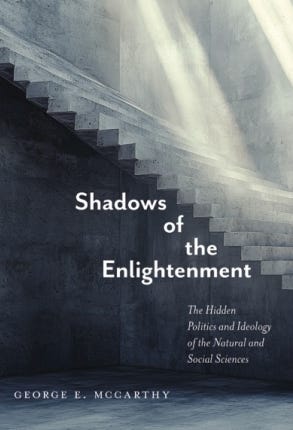The Nature of Knowledge and our Knowledge of Nature
A review of George E. McCarthy's Shadows of the Enlightenment
The following essay is my review of George E. McCarthy’s recent book, Shadows of the Enlightenment: The Hidden Politics and Ideology of the Natural and Social Sciences, from Monthly Review Press. Full disclosure, this is a fair bit more technical, dense, and jargony than I what typically write for Brief Ecology. But McCarthy’s text is extraordinarily dense and academic, and it warranted being met on that level. I apologize in advance.
The Nature of Knowledge and our Knowledge of Nature
George E. McCarthy writes that “The logic of Western reason and science reflects the underlying logic and principles of capital production”. Tracing these reflections to their origins is the purpose of his book, Shadows of the Enlightenment. Throughout the book, McCarthy meticulously examines the philosophical, metaphysical, epistemological, and ontological development of Western science and the corresponding criticisms of its knowledge claims. McCarthy’s project is to reveal that Western science as a system of knowledge and way of knowing the world is inseparable from the capitalist paradigms in which it arose. As such, he links the domination of nature and humanity inherent to capitalist modes of production to the quantitative and formal structures found within the foundations of Western science.
McCarthy locates the origin of Enlightenment reason and science in the Cartesian notions of a mathematical, idealist, deterministic, and divine nature. Descartes’s metaphysics were founded in his theology. However, he also identifies in Descartes’s work a move from the metaphysics of being toward placing the foundation of knowledge in humanity’s agricultural production as an advancement in the control and domination of nature. For McCarthy, this seed in Cartesian physics sets the stage for the separation of ethical reason from a mechanistic and machine-like conception of nature which is exploitable by the logics of capitalism.
In fact, McCarthy takes this much further by applying a Marxist framework to reveal the co-determination of capitalist production and the rise of scientific quantification. Since Descartes, McCarthy reveals the ways in which Western science’s statistical and empirical methodology allows for the mathematization of nature required by capitalism to both produce commodities from nature and to subjugate labor under increasing efficiency. He insists that one is not possible without the other, and a question that permeates throughout the text is whether or not general methodology of science (and the knowledge is produces) is irrevocably tied to the capitalist system.
A fundamental obstacle to deploying Western science toward socialist means, for McCarthy, is that its very methodology is what structures Western science’s assumptions of a deterministic nature, locking it into a circular logic that prevents any application or usefulness beyond reinforcing the political economy in which it developed. Here, McCarthy deconstructs the ontological and epistemological arguments that question the objectivity of Western science. This critique originates in the Kantian tradition of questioning objects and their substance versus our own representations and impressions. Since all scientific observations are filtered through our own interpretations, it is impossible to fully separate subjectivity from objective claims. Furthermore, the Cartesian origins of objectivity themselves originate in the metaphysical assumptions of causality and a deterministic universe, placing the theoretical knowledge claims before the empirical observations upon which they are meant to be based. This further enmeshes the empiricism of science in a circular logic that undermines its own credibility.
Of course, Western science has proven extraordinarily useful in its predictive powers and utility to the expansion of capitalist production. Drawing upon neo-Kantian analysis McCarthy argues that it is through this utility alone that Western science is able to legitimate itself. If there is no way to get “behind” our own subjective perceptions of the universe, then the utility and methodology of Western science are its only foundations, once again returning it to the origins of capitalism.
McCarthy extends this examination to the social sciences as well. The reduction of social phenomena to psychologism and quantification makes social critique and social theory impossible. Sociology, as he reveals, can no longer view the totality of society in its wholeness nor analyze it in ethical, meaningful, or political contexts.
However, despite McCarthy’s attempt to provide an exhaustive tracing of Western science’s origins, trajectory, and criticisms, he misses several important points of development. First, by omitting even a cursory examination of the ways in which language, discourse, and representation intersect with meaning and power in the works of Derrida and Foucault. This omission prevents McCarthy from engaging with theoretical developments within human geography, particularly that of social nature theory. Incorporating social nature theory into McCarthy’s analysis extends to a broader understanding of how the very definition of nature is both socially constructed and produced. The authority of Western science sets bounds for what constitutes nature, but is also a product of society’s nature discourses. In this way, the objects of scientific analysis are themselves socially constructed, interpreted, and produced, further complicating and contextualizing claims of objectivity.
Another strand of theoretical development missed by McCarthy is Murray Bookchin’s social ecology, grounded in the critical and social theory of anarchism. Drawing from Hegel’s dialectical method and Engels’s dialectical naturalism, Bookchin’s philosophy derives an ethics of ecology from the inherent complexity, diversity, and interactivity of nature. This ecological ethics places humanity along a non-hierarchical continuum of evolutionary development in which subjectivity is what constitutes consciousness and society. That human society arose from a non-human nature, nature itself provides the ethical grounds in which production can be organized and society structured. Bookchin’s social ecology infuses dialectical naturalism with an ethical and subjective dimension while preserving the logic and rationality of Western science. It also leads to much the same conclusions that McCarthy finds in Marx’s regarding social freedom and participatory democracy.
Lastly, in his focus on the reduction of all Western science to physics, McCarthy is unable to include an especially relevant debate in the philosophy of ecology. In fact, much of the developments in theoretical ecology during the twentieth century sprang from the debates among reductionism, holism, essentialism, and materialism. From these debates, dialectical approaches to ecological theory emerged in the works of Marxist ecologists Levins, Lewontin, and Gould. Though McCarthy is perhaps justified in his narrow focus given the continuation of reductionist paradigms in ecology and debates around the role of context in ecological dynamics.
Despite these omissions, McCarthy’s Shadows of the Enlightenment is an ambitious project that turns a powerful lens on the foundations of Western science. It may not be immediately clear why such a critique of science is important or even relevant in the current moment, and may even lead some to think that McCarthy’s text lends validity to the reactionary and fascist elements of our current society, with its bent towards anti-intellectualism. But it is precisely because of Western science’s inability to address the political context of scientific issues like climate change that prevent it from identifying the underlying economic drivers of capitalist production. It is also the absence of ethical consideration and dialectic reason that allows fascism to flourish within a capitalist society that has no meaning beyond mechanistic efficiency and wealth accumulation.
Unfortunately, the text does not culminate in a direct answer to its driving questions about the compatibility of Western science with other, socialist forms of political economies. McCarthy ends his analysis by returning to Marx, providing a brief but broad summary of his works that extend beyond political economy into the realms of social justice and democracy, which is perhaps his answer by way of integrating science with an ethically structured society.





this is something ive also been thinking about recently with respect to LLMs and AI generally, how the training of them is inherently focused on the same kind of nonsense tests weve been shoving down kids throats for a century
You had me at the title!👏